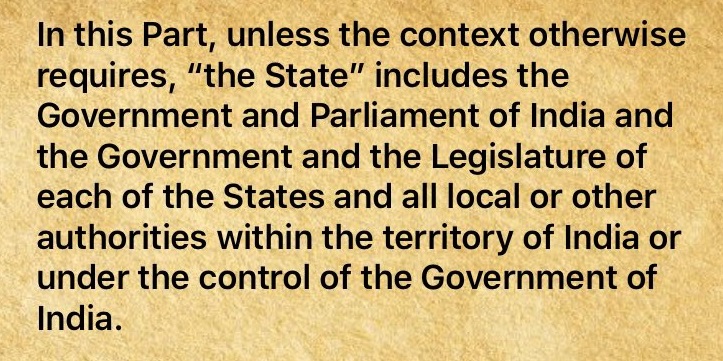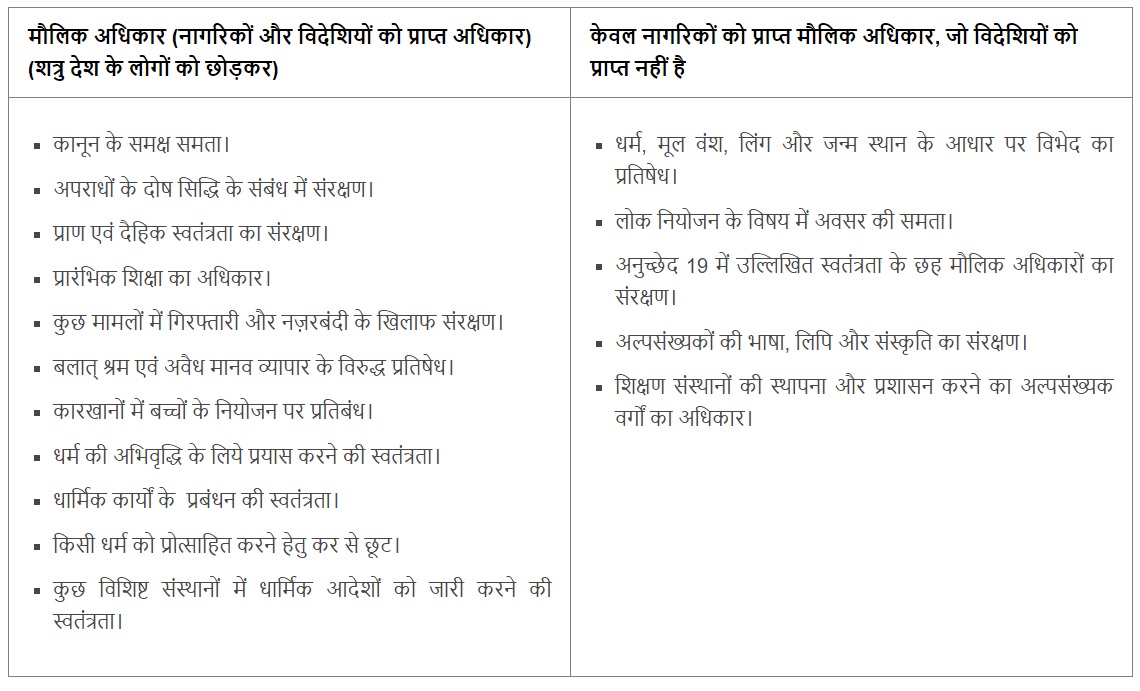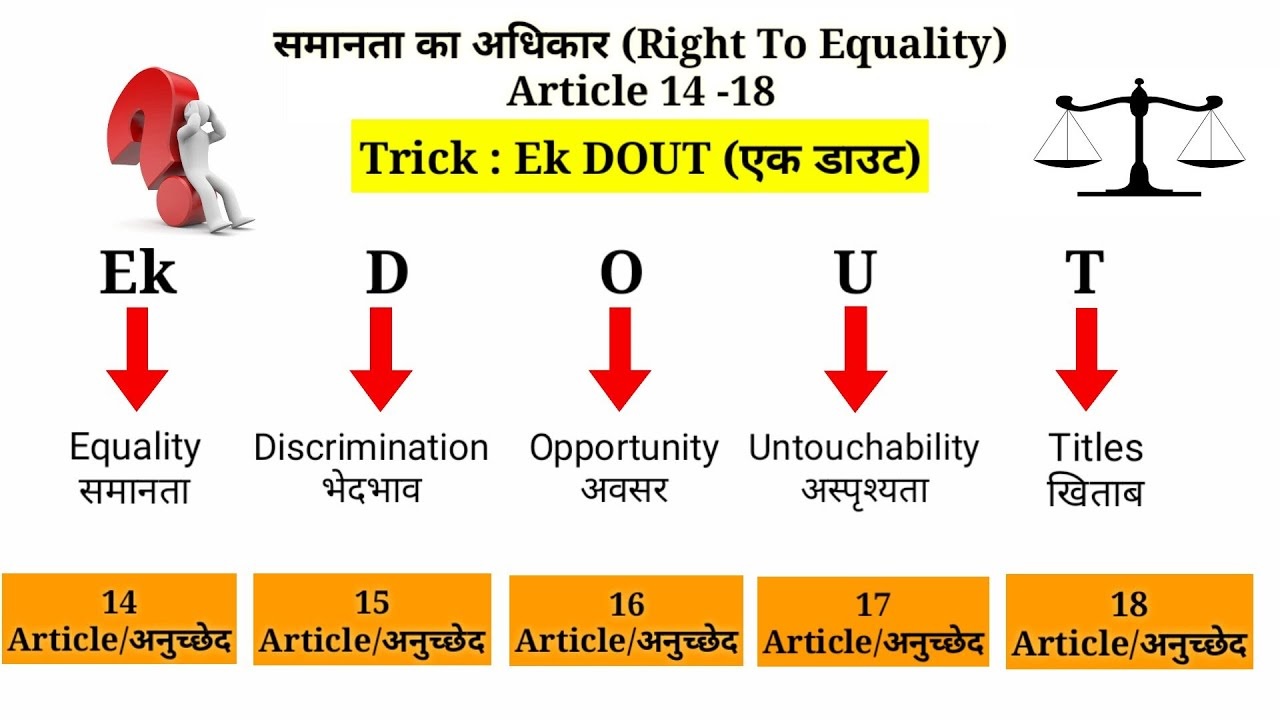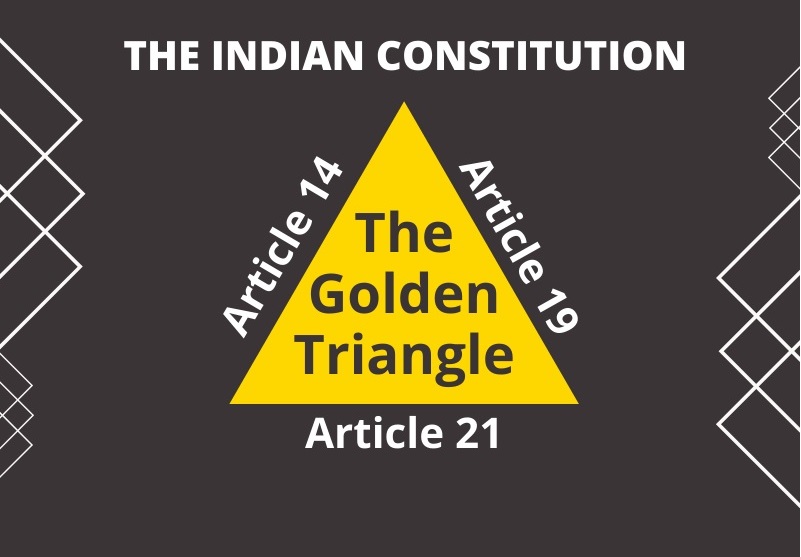वापस जायें / Back
Fundamental Rights under Part-III of the Constitution - Part-1
King John of England had issued a written document of right of the Public in the year 1215 under the pressure of Nobles, which was called Magna Carta. Fundamental Right under Part-III Articles 12 to 35 of Constitution of India are compared with Magna Carta.
Claim of most of the Fundamental Rights is made against the State not against private persons. State is defined in Article 12 of the Constitution. Government of India and Parliament and Government of States and Legislative Assemblies and all local and other authorities under their control are included in the word "State". State also works through some instruments. These instruments also come under the definition of State under Article 12 . The agencies through with the State performs its functions are also considered State. A question has been raised whether Judiciary is included in the word "State" or not. If Judiciary is also considered State then it will have to be considered that the protector of fundamental rights is itself also capable of violating them. Honourable Supere Court has held in Rupa Ashok Hurra v. Ashok Hurra, 2002 that no judical proceeding can be considered to be violative of fundamental rights. High Courts do not come under the ambit of the word "State" under Article 12.

The Fundamental Rights under Indian Constitution are not unlimited. Reasonable and necessary restrictions can be put on them by the State. What is reasonable and necessary can be decided by the Court. Therefore a persons aggreaved by these restrictions can approach the Court. Article 32 allows the people to directly approach the Supreme Court. It must also be remembered that right to apporach the Supreme Court under Article 32 is itself a fundamental right.
Judicial Review- Article 13 of the Constitution of India declares that laws in contravention of or limiting the scope of fundamental rights shall be void.Supreme Court under Article 32 and High Courts under Article 226 have the quthority to declare such laws as void by judicial review.
There are 6 Fundamental Right under the Constitution from Article 14 to 32 -
- Right to Equality - Article 14 to 18.
- Right to Freedom - Article 19 to 22.
- Right against Explotation - Article 23 and 24.
- Right to Freedom of religion - Article 25 to 28.
- Educational and Cultural Rights - Article 29 and 30.
- Right to Constitutional remedies - Article 32.
Right to Property was included in the Original Constitution under Article 31, but it was removed from Part-III - Fundamental Rights by the 44th Constitutional Amendment Act, 1978 and was kept in Part XII, Article 300 (A).
Some Fundamental Rights are available only to Citizens of India and some are available to all individuals, which include foreiners, counils, companies and such other juristic persons.
Suspension of Fundamental Rights -
- Except rights under Article 20 and 21, other Fundamental Right can be suspended during National Emergency.
- Fundamental Right under Article 19 can only be suspended if National Emergency is decalred on the basis of war or external aggression. This right cannot be suspended during National Emergency on the basis of armed rebellion or internal disturbances.
- Parliament can impose restrictions on the fundamental rights of armed forces, paramilitary forces, intelligence officers,etc. - Article 33.
- Fundamental rights can also be suspended in any area which is under Martial law.
Those fundamental rights which are avbailable to everyone whether they are citizens or not, except enemy aliens -
- Equality before law.
- Protection regarding conviction of crimes.
- Protection of life and liberty.
- Right to Primary Education.
- Protection against arrest and house arrest in some cases.
- Prohibitions of bonded labour and illegal traffic in humans.
- Prohibition of emplyment of children in factories.
- Freedoms to preach a religion.
- Freedom of management of religious affairs.
- No taxation of propogation of religion.
- Freedom of religious order to some religious institutions.
Fundamental rights which are available citizens and are not available to aliens
- Prohibition on discrimination on the basis of religion, race, sex and place of birth.
- Equality of opportunity in public employment.
- Protection of the 6 freedoms under Article 19.
- Protection of langauge and script of minorities.
- Right of minorities to establish and administor educational institutions.

Today we will talk about Right to Equlaity which is given in Articles 14, 15, 16, 17 and 18. You can remember them by the trick shown in this photo - This trick is Ek Dout - E for Equality, Article - 14, D for Disctimination Article - 15, O for opportunity Article - 16, U for untouchability, Article - 17 andf T for Title, Article - 18.

Equality before Law: Article 14 - Euality of Status and of opportunity is given in Preamble to Indian Constitution. This right is given to citizens and all others equally. It has two aspects -
- Equality Before Law- This is the concept in English Law which means, no person has any special rights. Law is equally applicable to all. Noone is above the law. This is also called Rule of Law.
- Equal Protection of Law- This is teh concept from the First section of Fourteenth Amendment in the American Constitution. It gives a guarantee of equal protection of law to all without any discrimination. This expects prosivitve action by the State. This is a guarnatee of similar treatment in similar situations. This also means that similar treatment of dissimilar persons will also be injustice.

Exceptions -
Article 361 - President of India and Governors of States cannot be called before any Court for any action taken during their tenure as such President or Governor. No action can be started in any Court against President of Governor during theri tenure.
Article 361-A - There can be no suit in any Court for publication of proceedings in the Parliament of State Assemblies.
Article 105 - No action can be taken in any Court against any member of Parliament for anything said by him or opinion given by him in Parliament or its committees.
Article 194 - No action can be taken in any Court against any member of Legislative Assembly if a State for anything said or opinion given in the Assembly or its committees.
Foreign rulers, ambassadors and diplomats are immune from civil and criminal cases in Indian Courts.
Important Judgements on Article 14-
- Supreme Court has held in E.P. Royappa v. State of Tamil Nadu, 1974, that Article 14 gives protection against arbitrary action by the State.
- In S.G. Jaisinghani v. Union of India Justice Subbarao has said in paragraph 14 "In this context it is important to emphasize that the absence of arbitrary power is the first essential of the rule of law upon which our whole constitutional system is based. In a system governed by rule of law, discretion, when conferred upon executive authorities, must be confined within clearly defined limits."
- Justice Bhagwati has geld in Maneka Gandhi v. Union of India, 1978, that equality gives a right against arbitrainess of the State. Equal treatment of all is expected from the State. 7 judges bench in this case has considered it a golden triangle as shown in the photograph - "a trinity exists between Article 14, Article 19 and Article 21. All these articles have to be read together. Any law interfering with personal liberty of a person must satisfy a triple test: (i) it must prescribe a procedure; (ii) the procedure must withstand the test of one or more of the fundamental rights conferred under Article 19 which may be applicable in a given situation; and (iii) it must also be liable to be tested with reference to Article 14."

- Supreme Court has held in Ram Krishna Dalmia v. Justice Tendolkar, 1958 that State can classify inspite of the restrictions in Article 14 - "provided that the classification is founded on intelligible differentia (i.e. objects within the class are clearly distinguishable from those that are outside) and has a rational nexus with the objective sought to be achieved by the classification."

- Indra Sawhney v UOI, 1993 is a very important judgment with respect to reservations. In this judgement the Court has held - "Article 16(1) is a facet of Article 14. Just as Article 14 permits reasonable classification, so does Article 16(1). A classification may involve reservation of seats or vacancies. The principle aims of Article 14 and 16 is equality and equality of opportunity and Clause (4) of Article 16 is a means of achieving the very same objective. Both the provisions have to be harmonized keeping in mind the fact that both are the restatements of the principle of equality enshrined in Article 14."
- Rights of working women have been interpreted under Article 14, 19 and 21 of the Cnstitution in Visakha v State of Rajasthan, 1997. The Court has held sexual harrassment at work place to be a violation of gender euqality of women and also a violation of life with dignity.
- In National Legal Service Authority [NALSA] v UOI, 2014 Supreme Court has held discrimination against persons of third gender to be violation of fundamental rights.
- In Shayara Bano v UOI, 2016 a 5 judge bench has held tripple Talaq (Talaq-ul-biddat) to be ultra-vires of the Constitution.
Prohibition of discrimination - Article 15 - There shall be no discrimination by the State against any person only on the basis of religion, race, caste, gender or place of birth. This right is given only to citizens.
Exception -
Provisions can be made for making speical laws for upliftment of women, children and socially and educationally backward classes. (Positive discrimination). For example reservation, free education etc.
Equality of opportunity in public appointments - Article 16 - There shall be equality of opportuunity for all citizens in subjects related to public appointmnets.
Exceptions-
- State can make special provisions for reservations of posts in cases where there is no equal representation in services of the State.
- Arrangment can be made on the basis of religion for membership in the executive council of religious institutions.
Abolition of Untouchability - Article 17 - Untouchability has been abolished and its practice in all forms is prohibited and is also an offence which is punishable. A person convicted of the offence of untouchability has also been disqualified from election for member of Parliament and State Assemblies.
These offence include -
- Publicity of untouchability directly or indirectly.
- Stopping the entry of any person on the basis of caste in any shop, hotel, public place of worship and entertainment.
- Stopping entry in hospitals, educational institutions, hostels of any other place of public purpose.
- Holding untouchabilty to be correct on traditional, religious, philosophical or other reasons.
- Insulting a person belonging to Scheduled caste on the basis of untouchability.
Supreme Court has held in People’s Union for Democratic Rights v. Union of India, AIR 1982 that if rights under Article 17 of any person are viloated by a private individual, it is the duty of the State to protect the victim and take immediate action. In State of Karnataka v. Appa Balu Ingale Supreme Court has held that untouchabiity is a form of slavery.
Abolition of Titles - Article 18 - Abolishes all titles and makes four provisions with respect to them:
- The State shall not given any title other than honours in armed forces for for education.
- Indian citizens shall not accept any titles from any foreign State.
- Any person holding an office of profit under the State shall not accept any title from any freign State without the concurrence of the President of India.
- Any person holding any office of profit under the State shall not accept any gift, achievement or post in any form fromany foreign State or any institution under it without the concurrence of the President of India. Supreme Court has held in Balaji Raghavan v. Union of India, AIR 1996, that Bharat Ratna and Padma awards are not titles under Article 18.